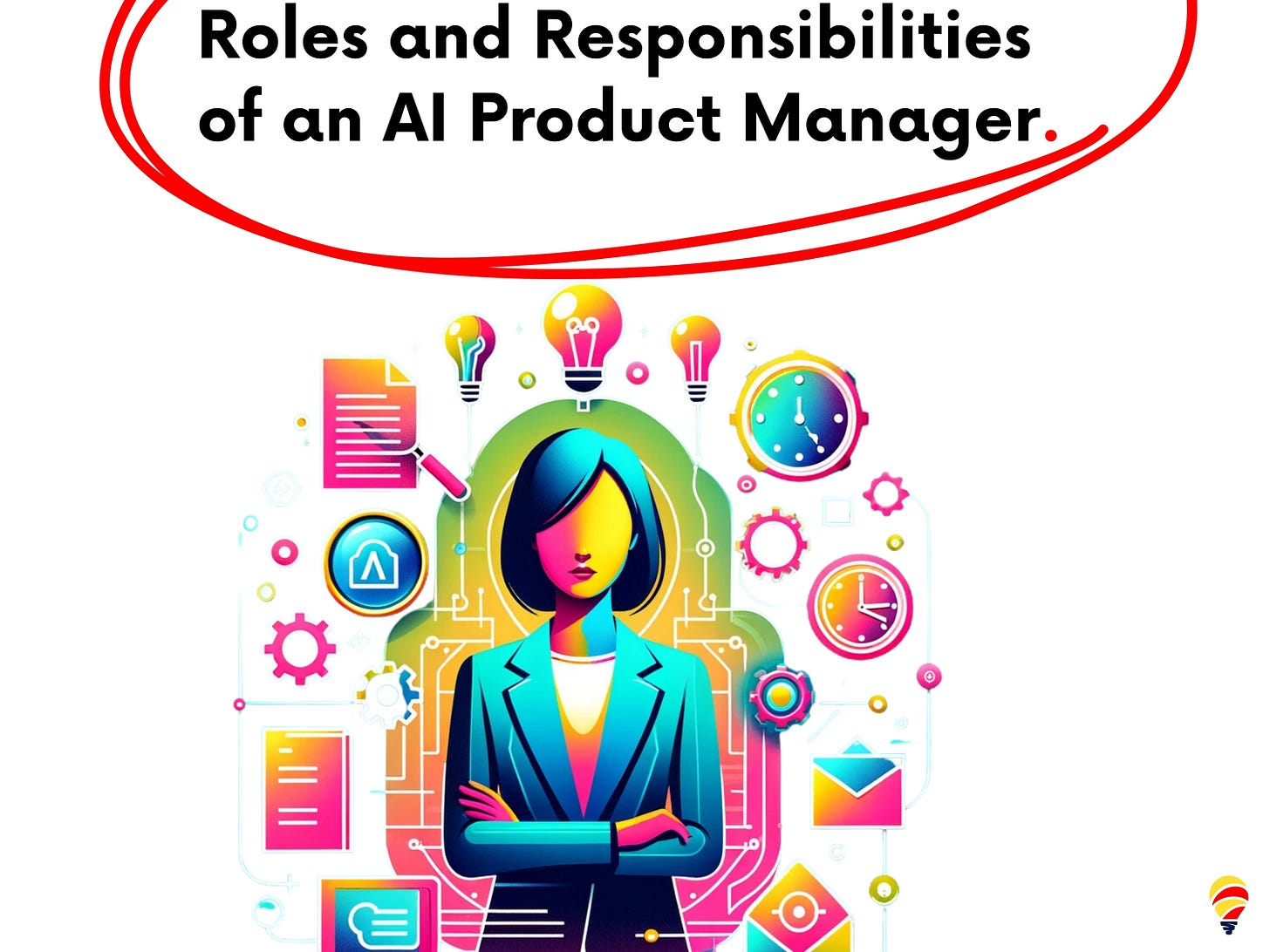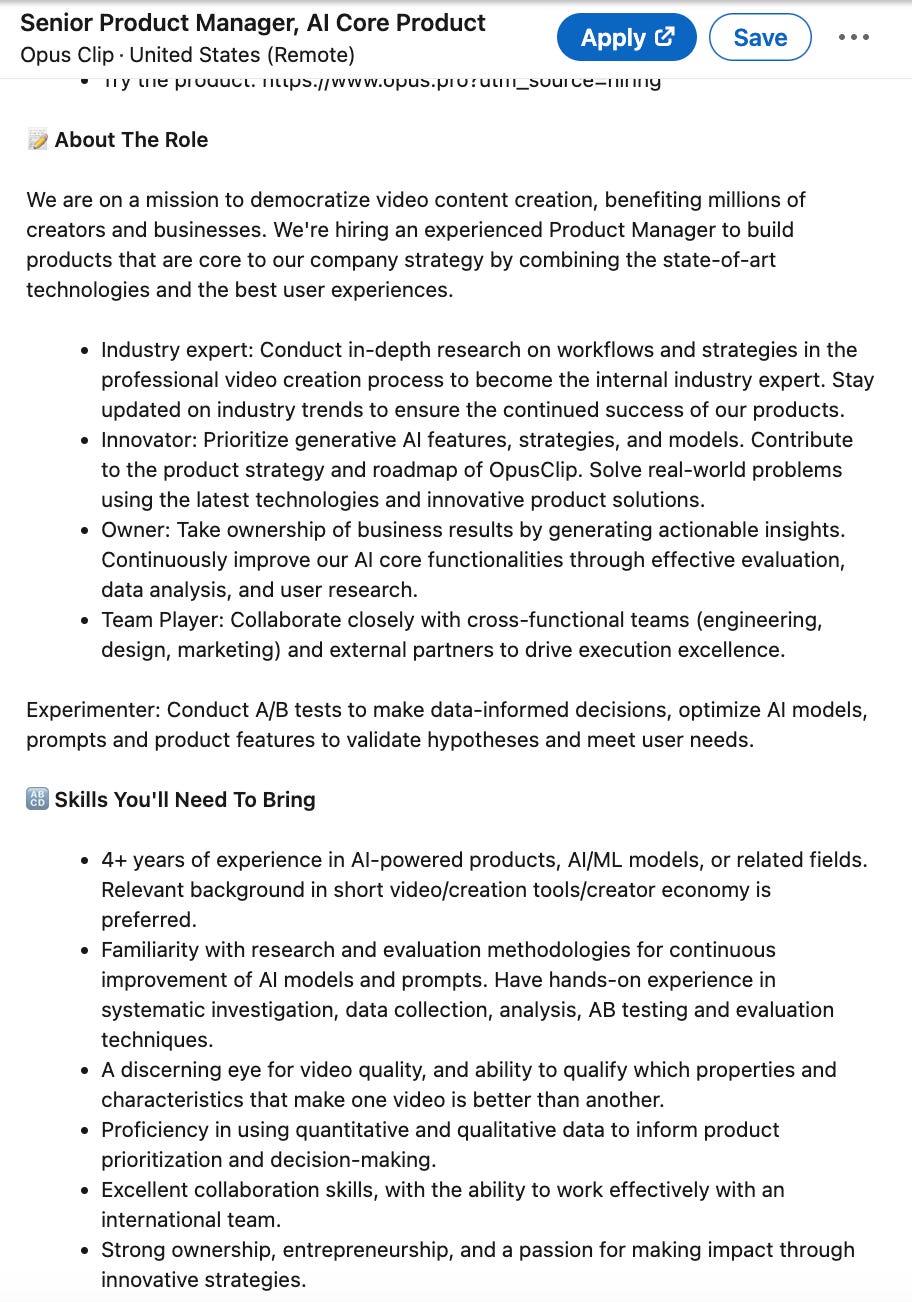🌟 Don't Miss the Opportunity to Elevate Your AI Knowledge!
I am absolutely thrilled to announce the upcoming 5th edition of our exclusive 10-part newsletter series, designed specifically for product managers venturing into the exhilarating world of AI and Large Language Models (LLMs). Whether you've been with us from the start or are just joining, this series is your key to unlocking a world of AI knowledge. 🌐🤖
Upcoming Editions - Your Comprehensive Guide:
❇️ Roles and Responsibilities of an AI Product Manager
❇️ 'Moat' in AI and Tech
❇️ Building Your Own LLM
❇️ AI Integration in Product Development
❇️ Ethical AI and Responsible Product Management
❇️ AI's Future in Product Innovation
Quote
Success in AI product management requires a harmony of technical insight, business acumen, and a deep empathy for user experience. Strive to balance these elements, and you will not only lead with innovation but also drive meaningful change.
Poll
TLDR:
Roles and Responsibilities of an AI Product Manager
AI Product Management
Key Responsibilities
Research & Discovery
Strategy & Planning
Development
Execution
Product Launch
Growth & Scale
Key Skills
Educational Background
Roles and Responsibilities of an AI Product Manager
As artificial intelligence continues its rapid adoption across industries, a critical role bridging business and technology has emerged - the AI product manager 🤖. AI product managers oversee the development of AI-powered products and drive their market success.
But what skills, tasks and responsibilities make an exceptional AI product manager? Let's find out!
AI Product Management
AI product management meshes product development principles with modern approaches in data science and machine learning. At its core, it focuses on:
Defining Opportunities: Identifying use-cases where AI drives automation, personalization and innovation
Envisioning Solutions: Conceptualizing AI product ideas aligned to business and user needs
Orchestrating Development: Leading agile sprints integrating engineering, data and design
Ensuring Viability: Validating technical feasibility, commercial viability and social responsibility
Driving Adoption: Curating go-to-market positioning, messaging and launches
AI product managers serve as the connective tissue across stakeholders in technology, business and experience domains.
Key Responsibilities
While specific accountabilities vary by company, common responsibilities are:
Source: AI PM Role posted on Linkedin
Research & Discovery 🕵️
Monitor advances in academic research and industry applications of AI
Conduct user studies, market analysis and technology landscape reviews
Identify greenfield opportunities to leverage AI and machine learning
Analyze competitor offerings based on functionality, differentiation and traction
Develop burner maps showing addressable market size and expansion paths
Strategy & Planning 📝
Conceptualize and evaluate potential AI product ideas and features
Define guiding vision and high-level roadmaps to bring ideas to fruition
Conduct business case analysis outlining assumptions, resources needs, and ROI
Gain buy-in from stakeholders by conveying value proposition and priorities
Development 🛠️
Create user stories capturing desired functionality in business terms
Work with data engineering teams to assemble, label and pipeline data
Collaborate with ML engineers to iteratively experiment with model architectures
Guide UX design to effectively expose AI capabilities and orchestrate flows
Execution 🚀
Coordinate work of agile, cross-functional product teams with clear stories
Continuously align engineering, design and data science with end-goals
Make trade-off decisions based on feasibility, resources and business impact
Ensure rigorous model evaluation, explainability, robustness and transparency
Product Launch 🎉
Craft messaging highlighting key differentiators, value drivers and use cases
Develop pricing strategies and business models optimized for adoption
Define sales plays and co-create GTM plans with marketing teams
Plan customer onboarding flows providing education on capabilities
Growth & Scale ⚡
Instrument product analytics and usage dashboards to capture insights
Analyze adoption patterns across user segments to isolate friction
Optimize conversion funnels through systematic experimentation
Identify expansion pathways and scout adjacency opportunities
As we can see, AI product managers have diverse accountability spanning strategy, execution and commercialization. Next, let's explore must-have competencies.
Key Skills
The multifaceted nature of the role demands well-rounded proficiencies:
AI and Data Literacy 🤖
Working knowledge of machine learning pipelines and common techniques
Ability to interpret model evaluation metrics and analysis reports
Familiarity with tools like Python, SQL, Tableau, Looker and Jupyter
Technical Acumen 💻
Practical understanding of capabilities and limitations of AI systems
Architectural thinking linking business context with technical feasibility
Development cycle literacy across data, model iteration and system build
Business Savvy 📈
Financial modeling skills assessing assumptions, costs and returns
Market awareness and Go-to-market planning methodologies
Ability to decipher industry dynamics and spot whitespace opportunities
Strategic Thinking 💡
Systems view connecting market gaps with technology capabilities
Evaluating tradeoffs balancing feasibility, resources, and benefits
Crafting compelling visions and actionable roadmaps
Stakeholder Alignment ✅
Evangelizing ideas persuasively to diverse audiences
Forging consensus through clarity on priorities and decision drivers
Conflict resolution and expectation management
User Empathy 🙋♀️
Deep understanding of customer jobs-to-be-done
Incorporating qualitative insights into solution framing
Upholding human-centric values throughout lifecycle
This combination of business leadership, technology expertise and user orientation makes AI PMs truly unique.
Educational Background
While some AI product managers transition from technical roles, academic backgrounds providing balance across domains are ideal preparation:
Computer Science 👩💻
Essential for computational thinking and exposure to programming - especially ML techniques
Business Administration 👔
Builds business acumen spanning strategy, marketing, finance and accounting
Design 🎨
Imparts user-centricity and human-factors orientation missing in tech curriculums
Cognitive Psychology 🧠
Useful for experience mapping and developing contextual understanding
Data Science 📊
Provides statistics and analytics proficiency for interpreting model behavior
Ethics 🤝
Introduces considerations around transparency, fairness and accountability
Hands-on experience also accelerates learning - especially rotating through business and technical domains.
Transitioning into the Role ☝️
For aspiring product managers, here are some tips to pivot towards AI:
💡 Learn Core Concepts - Take ML and AI courses to understand key techniques
🎓 Enhance Technical Chops - Pursue certifications and self-led experiments
📚 Understand PM Methodologies - Grasp frameworks like agile, design thinking and JTBD
✍️ Showcase Relevant Experience - Seek opportunities to incorporate user research, data analysis and technical collaboration into your work
🗣️ Strengthen Storytelling - Practice pitching ideas and explaining complex topics simply
👥 Network - Follow AI leaders online and attend events to expand connections
With a structured approach, product managers from business and technical backgrounds can successfully transition into AI!
Key Takeaways
In this extensive guide, we explored what makes AI product managers indispensable:
They straddle business priorities, technical complexity and user intimacy
Accountabilities scale from research to product-market fit to ongoing enhancements
AI fluency meshed with commercial intuition creates differentiation
Demand for coupling technology innovation with business growth continues rising
For forward-thinking product talents, focusing on AI presents exciting adventures only just unfolding!
I spend a lot of time researching on topics to give you the best content, If you like my work please like and share it with others. If you have any feedback for me or want me to write on other topics please leave a comment below. Thanks for your continued support.
✌️ It only takes one minute to complete the Net Promoter Score survey for this Post, and your feedback helps me to make each Post better.
https://siddhartha3.typeform.com/to/ApU8zlRR
If you liked reading this, feel free to click the ❤️ button on this post so more people can discover it on Substack 🙏
Roadmaps & Product Development
Roadmap Design & Launch Strategies
Design Thinking & Problem Solving
🎉 Week 3 - Week in Product Series - Design Thinking (0 to 1)
✍️ Week 29 - A Step-by-Step Guide to Crafting Killer Problem Statements
Week 67 - How to Run a Design Sprint: The Ultimate Guide for Product Managers + Free Templates
Growth Strategies & Learning from Data
Development & Documentation





